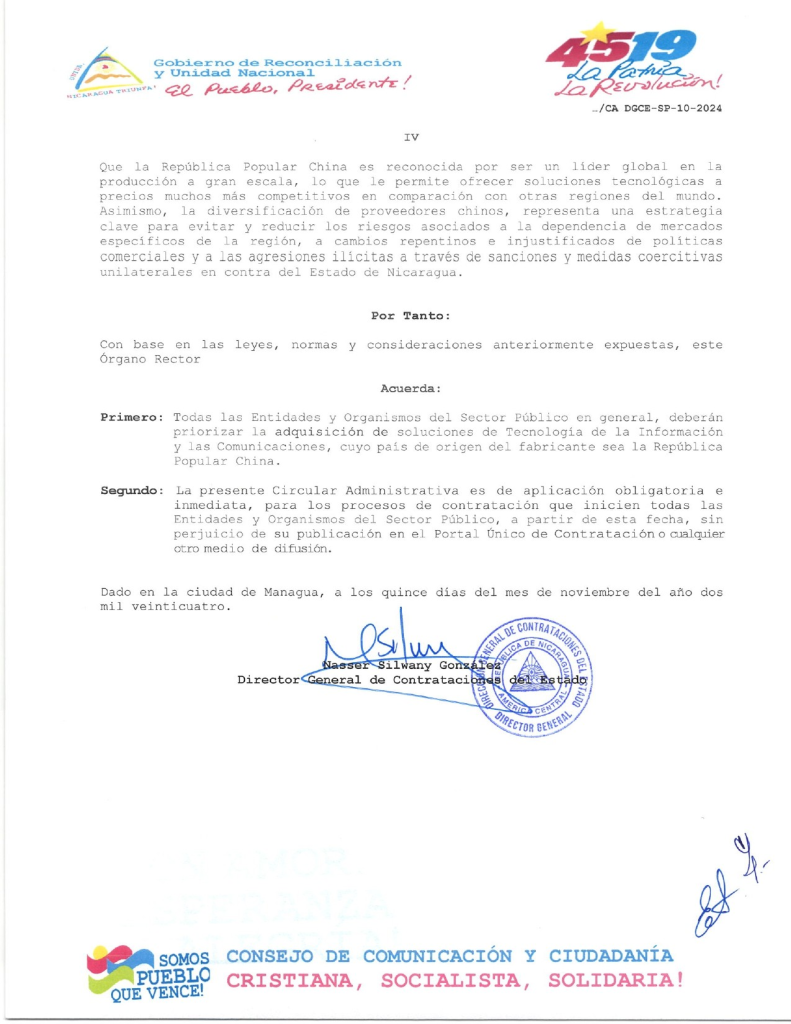On Friday, November 15, the Ortega-Murillo regime ordered all public institutions to prioritize purchasing goods or services related to information and communication technologies from manufacturers based in China. Experts argue that this directive violates domestic legislation, the Central America-Dominican Republic-United States Free Trade Agreement (CAFTA-DR), and other international trade agreements aligned with the principles of the World Trade Organization (WTO).
The decision was outlined in an administrative circular signed by Nasser Silwany González, head of the General Directorate of State Procurement at the Ministry of Finance and Public Credit (MHCP). The circular justified the measure by citing the Free Trade Agreement with China, which came into effect on January 1 of this year. According to the document, one of the treaty’s objectives is to “promote technological innovation and the transfer and dissemination of technology between the parties.”
In his arguments, the head of the ministry stated that diversifying Chinese suppliers represents “a key strategy to avoid and mitigate risks associated with dependence on specific regional markets, sudden and unjustified changes in trade policies, and unlawful aggressions through sanctions and unilateral coercive measures against the State of Nicaragua.”

Corruption Allegations
Nicaraguan economist Enrique Sáenz described the instructions issued by Silwany González, acting under a directive from Daniel Ortega and Rosario Murillo, as “an act of subservience, a servile behavior that contradicts their anti-imperialist rhetoric.” According to Sáenz, the decision reflects submission to Chinese power and may also be driven by corruption and fraud.
“This measure appears to be designed to benefit a select group of state-affiliated suppliers who are likely already aligned with Chinese companies to capitalize on the state procurement market for electronic services,” Sáenz warned.
For his part, political analyst and opposition figure Eliseo Núñez suggested that the decision might serve the personal interests of the ruling family. “It’s likely that Ortega’s children represent certain Chinese brands, and they are forcing the state to purchase from them. That is pure and simple corruption,” Núñez stated.

Geopolitical Misstep
Costa Rican economist Alberto Franco, former director of the National Bank of Costa Rica and his country’s former representative to the Inter-American Development Bank (IDB), believes the Nicaraguan regime’s policy cannot be understood outside the international context, particularly in light of former President Donald Trump’s recent electoral victory in the United States.
“I think this announcement must be viewed in the context of the U.S. election outcome and the likely intensification of trade and geopolitical tensions between the United States and China,” Franco told LA PRENSA.
Meanwhile, political analyst Eliseo Núñez suggested that the decision reflects the Ortega-Murillo regime’s belief that the United States could face economic collapse and that China will take its place as the world’s hegemonic power.
Violation of the Most-Favored-Nation Principle
The regime’s new policy contradicts the principles of the World Trade Organization (WTO), particularly the “Most-Favored-Nation” principle, which prohibits countries from discriminating between their various trading partners and requires equal treatment for all nations.
“This decision also sets a dangerous precedent. If a low-ranking official can violate international commitments, tomorrow we could see further procurement agreements favoring allies of China or Iran, further undermining transparency. It is evident that there are murky political and economic interests behind this measure,” said Sáenz.
Violation of CAFTA
According to a Costa Rican expert, who spoke on condition of anonymity, the new policy is discriminatory and contradicts the provisions of the CAFTA agreement.
Section 2 of Article 9.2 of CAFTA states that, among its general principles, no member state shall discriminate against a locally established supplier “because the goods or services offered by that supplier for a particular purchase are goods or services from another party.”
Additionally, Article 13.14 of CAFTA stipulates that no country shall prevent telecommunications service providers from having the flexibility to choose the technologies they use to supply their services, “including wireless mobile commercial services, subject to the necessary requirements to meet legitimate public policy interests.”
According to Franco, this measure will become an issue if the United States or an American company files a complaint against Nicaragua, though he stated it remains to be seen whether any country or company will react.
“From the perspective of the interests of the governments of Nicaragua and China, it will be important to monitor if there is any reaction from Nicaragua’s CAFTA partners or other external partners with whom Nicaragua has agreements on information technology,” Franco said.
Furthermore, free trade agreements typically include mechanisms to resolve disputes before escalating to open conflicts.

Violation of the Public Procurement Law
Although the circular cites Article 6 of the Public Sector Administrative Procurement Law (Law 737) to justify the mandatory purchase of Chinese technology under the principle of technological relevance, the same article states that all individuals and legal entities participating in procurement processes “shall do so under equal conditions.”
Furthermore, the article establishes the principles of equality and free competition, which require the promotion of broad, objective, and impartial competition, plurality, and participation of potential suppliers. It asserts that any interested party meeting the legal requirements should be able to participate in procurement procedures without being subject to any restrictions not derived from the technical and objective specifications related to the purpose of the bidding process.
For these reasons, Sáenz believes that “the measure lacks legal foundation and violates fundamental principles of the State Procurement Law, such as transparency, equality, and free competition, as it is based on a forced and incorrect interpretation of the law that attempts to justify it.”

Regime Claims National Security Argument
Sáenz noted that if the regime argues it will prioritize Chinese technology due to “sudden and unjustified changes in trade policies and unlawful aggressions through sanctions and unilateral coercive measures against the State of Nicaragua,” then, in line with this narrative, it could withdraw from CAFTA.
“If Nicaragua deems this policy valid, it should exit CAFTA. However, this would be unsustainable, given that more than 50% of its foreign trade occurs within that framework, mainly with the United States,” Sáenz said, referring to Article 22.7 of CAFTA, which states that any member state may withdraw from the treaty by notifying in writing, with the withdrawal taking effect six months later.
Data from the Ministry of Development, Industry, and Commerce (MIFIC) shows that between January and October of this year, of the $6,380.1 million Nicaragua exported across all regimes, $3,075.6 million went to the United States and $1,157.8 million to Central America. Exports to China totaled $72.7 million, an increase of 78 percent compared to the $40.8 million in the same period last year.
Regarding imports across all regimes, Central America and the United States are the main sources, in that order. China is the third largest source of imports, and between January and October of this year, the country imported $1,339.7 million from China, an increase of 16.4 percent compared to the $1,151.3 million imported in the same period last year.
This post was originally published on here







